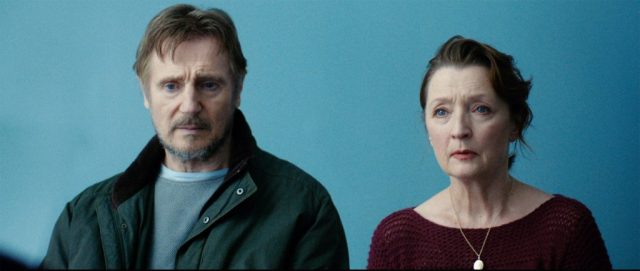Ordinary Love: Into the Unknown, by Scott Nye

You get sick, or your spouse gets sick. The diagnosis makes clear that this won’t be an easy illness. It might take up your year and be over, or that year might be the last. But it will be hard, and you won’t always know how to deal with it. For 90 excruciatingly-heartfelt, yet poignantly mundane minutes, Lisa Barros D’Sa and Glenn Leyburn explore such a year between Tom (Liam Neeson) and Lesley Manville (Joan), during which she battles breast cancer and he battles their lives slipping gradually out of their control.
The title, pedestrian though it may be, does aptly summarize the general spirit of the film. Tom and Joan are not exceptional people, having more or less drifted into middle-class retirement following the death of their daughter. They exercise together and watch TV in the evenings and spar a bit in conversation and have an active sex life. Like most couples in older age, they’ve seen some tragedy, and like the best couples, they’ve become stronger for it. So at every stage of Joan’s discovery, Tom keeps insisting it won’t be a problem; he’s been conditioned, to some extent, for survival.
Neeson has made steady work as an action star over the past decade (you could count on one hand the number of straight dramatic roles he played in the 2010s). Part of what makes him so effective in those films is his particular mix of steely-eyed determination mixed with a hint of fear about the unknown forces he’s up against. He might bat down that fear quickly or toss it aside, but he plays it as always ticking a little bit in the background. He applies that same approach beautifully here, determined to see his wife through her illness while delaying or denying a chance to have a real conversation about what it would mean if the worst was to happen.
On the other hand, Joan starts preparing herself for the worst from day one. This puts them at unspoken odds, and Owen McCafferty’s screenplay, refreshingly, doesn’t entirely resolve this distinction. Tom and Joan fight, but never quite about what they should be fighting about; they console one another, but never quite speak aloud their full fears. They hide behind their wit and charm, which seems to have sustained them through the pain this long, but now might not quite be enough.
McCafferty is an Irish playwright, making his screenwriting debut here, with some of the stage’s restrictions feeling like they still hem him in. Tom and Joan seem to have no other family or friends to share their suffering with; each of their lives revolves only around the other. This ends up having the fine effect of illustrating how little they have to count on besides one another, and how lost Tom would be without Joan, but it still feels like something of an oversight, the retained instincts from another medium’s limitations.
As is often the case with stories of chronic illness, the film ultimately rests on Manville’s shoulders, and her own mixture of resolve and vulnerability gives Joan a welcome, rough edge. I am absolutely terrified of hospitals, and Manville foregrounds Joan’s own fears in a way I found identifiable; the way you’re lead to beds and machines with no real ability to determine what use any of them might prove or expectation of immediate clarification once you think to maybe start raising a question. Manville has to bring Joan up from a total novice at the beginning to something of an expert in chemotherapy by the end, a transition she plays without abandoning Joan’s sunny nature nor her lingering fear. Even though it becomes routine for her, there’s still every chance it will prove futile.
The film is, above all, focused on the ordinary it promises – drives to and from the hospital, late nights of vomit, missed pills, trying to keep up routines, and trying to plan for some kind of future when every day is in question. That it denies us a full heart-to-heart or complete screaming match meant to lay bear everything Tom and Joan think and feel about each other is its boldest, and greatest choice, certain instead – and rightly so – that the sum of these small interactions will paint the portrait of them we need to know. D’Sa and Leyburn, themselves a husband-and-wife team, portray this process with a sure hand a little flair. Two-person dialogues could probably use a little more juice than a standard shot/reverse shot, but short, wordless passages like a scene in which Tom has the TV volume up too loud to hear Joan moaning in pain go a long way to illustrate the casual, unknowing cruelty we all show the people we genuinely love.
Acted with great sensitivity and told plainly and thoughtfully, Ordinary Love really caught me off guard, left me breathless and deeply moved.




























